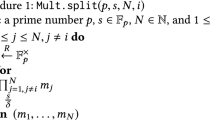Abstract
Ann argument function,f, is calledt-private if there exists a distributed protocol for computingf so that no coalition of at mostt processors can infer any additional information from the execution of the protocol. It is known that every function defined over a finite domain is [(n−1)/2]-private. The general question oft-privacy (fort≥[n/2]) is still unresolved.
In this work, we relate the question of [n/2]-privacy for the class of symmetric functions of Boolean argumentsf: {0, 1}n→{0, 1,...,n} to the structure of Hamming weights inf −1(b) (b∈{0, 1, ...,n}). We show that iff is [n/2]-private, then every set of Hamming weightsf −1(b) must be an arithmetic progression. For the class ofdense symmetric functions (defined in the sequel), we refine this to the following necessary and sufficient condition for [n/2]-privacy off: Every collection of such arithmetic progressions must yield non-identical remainders, when computed modulo the greatest common divisor of their differences. This condition is used to show that for dense symmetric functions, [n/2]-privacy impliesn-privacy.
Similar content being viewed by others
References
Ben-Or M., S. Goldwasser, and A. Wigderson, Completeness Theorems for Non-Cryptographic Fault-Tolerant Distributed Computation.Proc. Twentieth Ann. ACM Symp. Theor. Comp., 1988, 1–10.
Beaver D., Perfect Privacy for Two Party Protocols. Technical Report TR-11-89, Harvard University, 1989.
Benaloh (Cohen) J.D., Secret Sharing Homomorphisms: Keeping Shares of a Secret Secret.Advances in Cryptography—Crypto86 (proceedings), Springer-Verlag, Lecture Notes in Computer Science263 (1987), 251–260.
Chaum D., C. Crepeau, and I. Damgard, Multiparty Unconditionally Secure Protocols.Proc. Twentieth Ann. ACM Symp. Theor. Comp., 1988, 11–19.
Chor B., andE. Kushilevitz, A Zero-One Law for Boolean Privacy.SIAM J. Discrete Math. 4(1) (1991), 36–47. Early version inProc. Twenty-First Ann. ACM Symp. Theor. Comp., 1989, 62–72.
Chor B., and N. Shani, Privacy of Dense Symmetric Functions.Sequences II, Proc. Second Positano Workshop on Sequences, ed.R. Capocelli, A. De Santis, U. Vaccaro, Springer-Verlag, 1993, 345–359.
Kushilevitz E., Privacy and Communication Complexity.SIAM J. Disc. Math. 5(2) (1992), 273–284. Early version inProc. Thirtieth Ann. IEEE Symp. Found. of Comp. Science, 1989, 416–421.
Zosin L., Privacy of Symmetric Functions. M. Sc. thesis, Dept. of Computer Science, Technion, Haifa, Israel, 1993.
Author information
Authors and Affiliations
Rights and permissions
About this article
Cite this article
Chor, B., Shani, N. The privacy of dense symmetric functions. Comput Complexity 5, 43–59 (1995). https://doi.org/10.1007/BF01277955
Received:
Issue Date:
DOI: https://doi.org/10.1007/BF01277955




